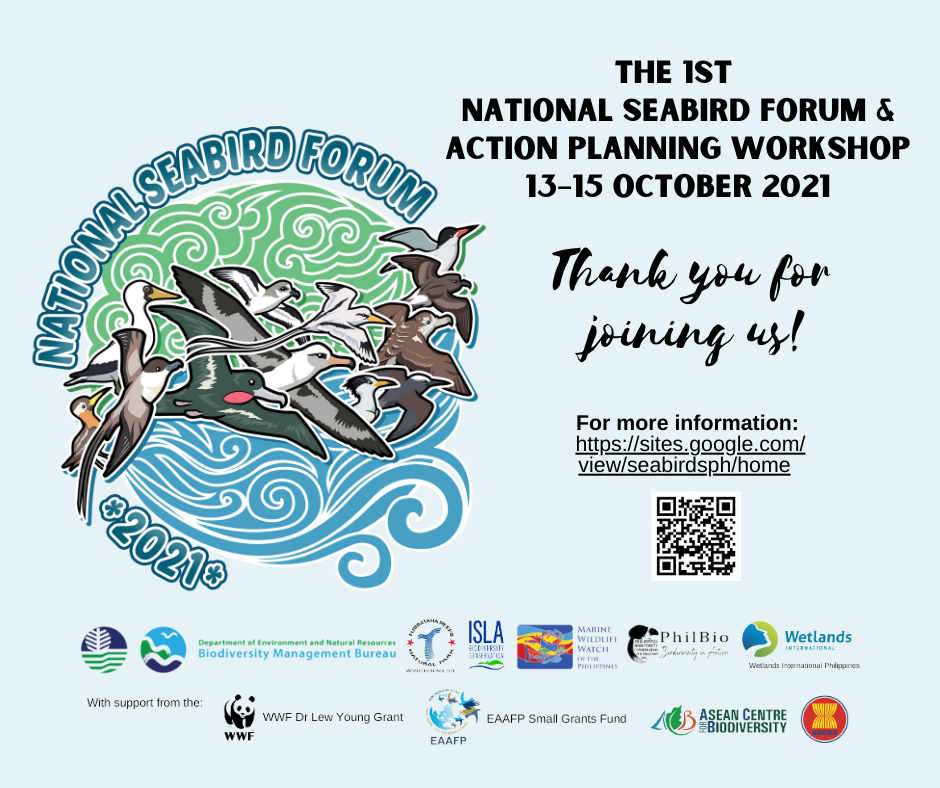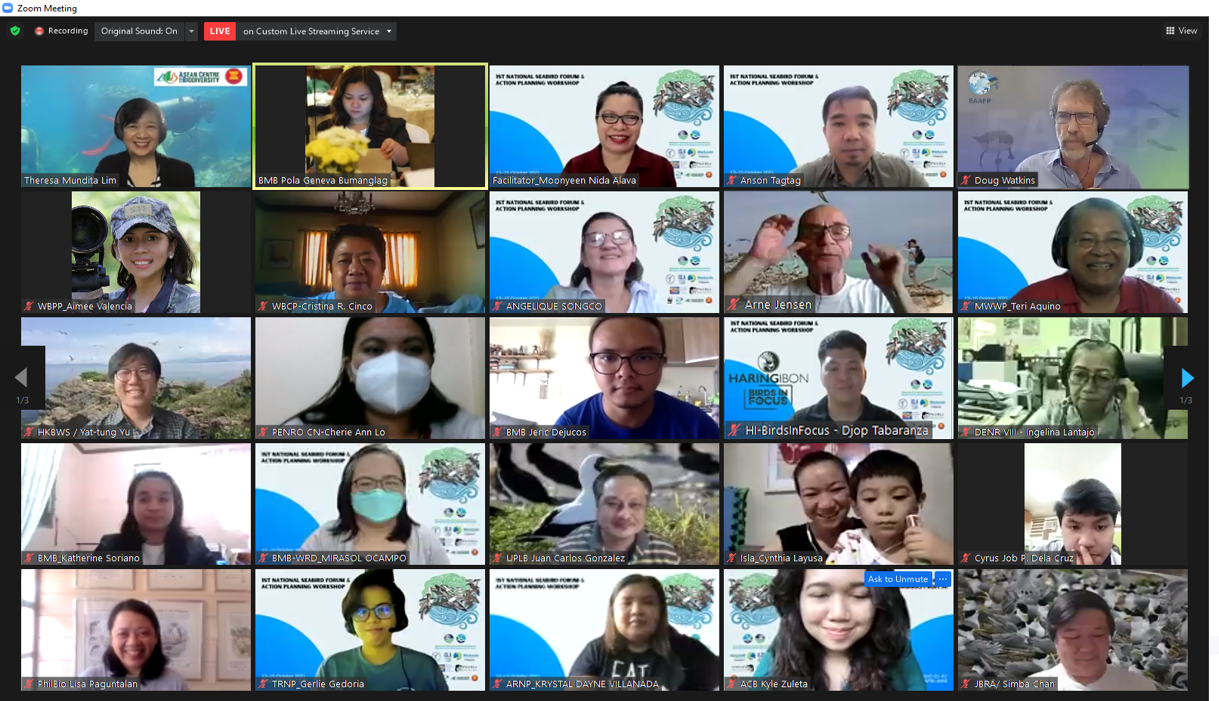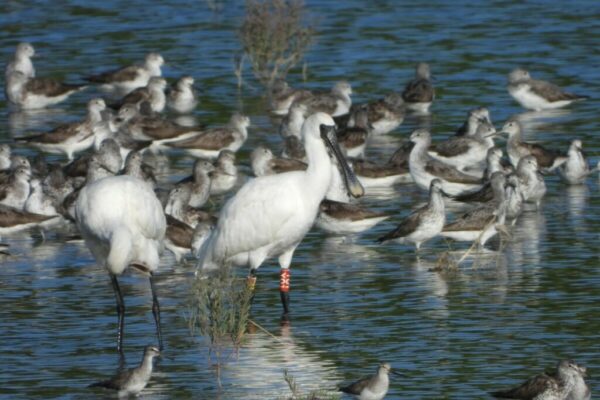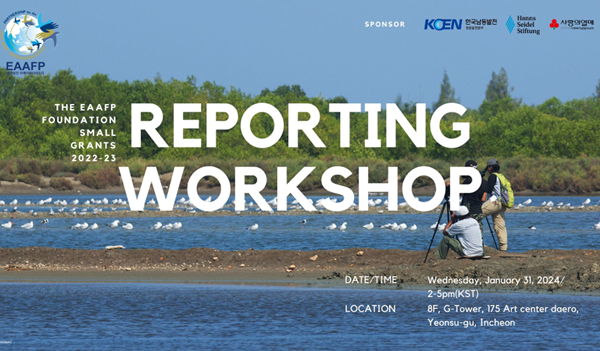Despite the restriction imposed by the COVID-19 pandemic, the 1st National Seabird Forum and Action Planning Workshop was successfully held online from 13–15 October 2021. Organized by a consortium of organizations including the Department of Environment and Natural Resources-Biodiversity Management Bureau (DENR-BMB), Isla Biodiversity Conservation, Tubbataha Management Office, Marine Wildlife Watch of the Philippines, Wetlands International, and PhilBio, the event aimed to consolidate information on seabird research management throughout the Philippines, identify conservation partners, and draft a conservation strategy plan for the seabirds in the country. This event was made possible through the support of the WWF Hong Kong Dr. Lew Young Grant, East Asian-Australasian Flyway Partnership (EAAFP) Small Grants, and the ASEAN Centre for Biodiversity (ACB).

Dr. Theresa Mundita Lim, Executive Director of ACB, opened the program with a message highlighting the vulnerability of migratory birds in general, and seabirds in particular, in the region. She also talked about the importance of conserving these bird species and their habitat in connection with the national, regional, and global objectives of the post- 2020 Global Biodiversity Framework. Mr. Doug Watkins, Chief of EAAFP Secretariat, discussed the initiatives, objectives, and challenges in conserving seabirds within the region, especially within the flyway network of which the Philippines is part of. Mr. Anson Tagtag of DENR-BMB talked about the commitments of the Philippines, such as the Convention on Migratory Species and the Convention on Biological Diversity, that influence the country’s mandates on seabird conservation. Dr. Juan Carlos Gonzalez, an ornithologist and bird curator from the University of the Philippines Los Baños, gave a rundown of what seabirds are and what makes this group of birds unique. Mr. Arne Jensen from Wetlands International presented the seabird habitats, distribution, and threats in the country. We also heard the reports from 14 sites throughout the Philippines. The speaker for each site identified the seabirds documented within their locality, the local threats to seabirds and their habitat, seabird research and conservation initiatives at the site, and the gaps and needs that hinder local managers from effectively conserving seabirds and seabird sites.
Seabirds in the Philippines are threatened by marine pollution, egg collection, reduced food sources, mismanaged tourism practices, mining and reclamation projects, and climate change. Despite this, this bird group has been overlooked in Philippine biodiversity strategies and action plans. The second part of the event–the action planning workshop–aimed to bridge this gap. The conservation strategy planning workshops aimed to address the threats and strengthen the country’s response to seabird management. The first workshop assisted the participants in identifying the potential seabird sentinel sites within the seas surrounding the Philippines. Priority was given to habitats where the 20 priority species breed or roost. In the second workshop, participants drafted the 5-year action plan for seabirds, focusing on key components that are deemed important to addressing local threats to seabirds and in managing their sites in the Philippines. This includes research and monitoring; policy development; management and enforcement; communications, education, and public awareness; and capacity building.

The forum was attended by more than 70 participants in Zoom; meanwhile, on Facebook, the online live streaming had over 7,000 posts reached and was shared over 80 times. The event was a historic event for seabirds: it was the first time in more than 20 years that a plan on seabirds was discussed. It was also the first time that this was done on a national scale, with representatives from different sectors including birdwatching groups, non-governmental organizations, private companies, academic institutions, and government agencies.
The 1st National Seabird Forum and Action Planning Workshop was successful in bringing together various bird experts and advocates and laid the groundwork for the future of seabird research and conservation. While the results of the workshops highlighted the daunting tasks that must be initiated and sustained to effectively conserve seabirds and their habitat, the event has brought in partnerships and learning opportunities to draw from. Examples like the Tubbataha Reefs Natural Park can provide years of experience and expertise to other seabird sites and marine protected area managers in the country. Further, the 1st National Seabird Forum has paved the way for a Seabird Technical Working Group and a network of seabird advocates and volunteers. The results and proceedings of the 1st National Seabird Forum and Action Planning Workshop will be endorsed to the Biodiversity Management Bureau for this to become adopted as the national strategy for seabirds in the Philippines.
For more information, you may visit the seabird forum microsite [here], or reach out to Isla Biodiversity Conservation www.isla.org.ph.
Prepared by Cynthia Adeline A. Layusa, Isla Biodiversity Conservation.
The project was funded through the 2021 EAAFP WG/TF Small Grant Fund. View the report, Click here.




